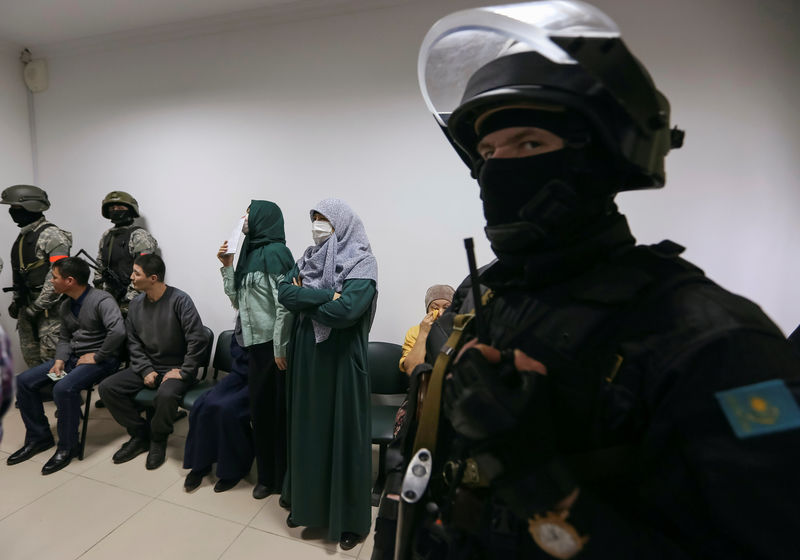ALMATY (Reuters) - Kazakh courts sentenced nine Islamic State supporters and two leading political activists to prison terms in separate trials on Monday after their convictions over the two biggest shocks to veteran President Nursultan Nazarbayev's rule.
While unrelated, street unrest in April and May and a deadly Islamist attack in June dealt twin blows to stability in the oil-producing Central Asian state run since 1989 by Nazarbayev, who has brooked no dissent but remained broadly popular thanks to rising general wealth until a recent currency devaluation.
Political activists Maks Bokayev and Talgat Ayanov were sentenced to five years in prison each on Monday. They led a public protest in the city of Atyrau in April that triggered street rallies elsewhere and forced Nazarbayev to shelve a planned land reform in what amounted to a rare climbdown.
Prosecutors said the nine men sentenced to terms of 20 years to life for murder and terrorism were Islamic State sympathisers who in June attacked a National Guard facility in the deadliest episode of Islamist violence in Kazakhstan's history.
Thousands of nationals from Central Asian nations are known to be fighting alongside Islamic State militants in Syria and Iraq, and authorities have long warned they could return and carry out attacks on home soil. Kazakhstan is mainly Muslim, but a vast majority of Kazakhs are non-observant.
Bokayev and Ayanov were convicted of "inciting social and ethnic hatred", spreading deliberately false information at public events and failing to secure advance approval for their protest from the authorities, the court said. They both denied wrongdoing and plan to appeal against the verdict.
The wave of protests initially focussed on government plans to ease restrictions on land ownership by foreigners and auction off large tracts of farmland.
But the rallies evolved into broader anti-government unrest, driven in part by an abrupt depreciation of the tenge currency after it lost nearly half its value against the dollar.
In August, Nazarbayev deferred land reform for five years.
Unlike the generally peaceful protests launched by the Atyrau activists, the Aktobe attack, blamed on followers of Salafism, an ultra-conservative school of Islam, stunned the ex-Soviet republic of 18 million with its unprecedented violence.
On June 5, 27 men attacked two stores selling firearms and then stormed the National Guard site and killed seven people. Security forces killed 18 of the attackers during the shootout and the subsequent manhunt.

In July, a lone gunman with Islamist links killed at least three policemen and two civilians in Kazakhstan's financial capital Almaty, senior security officials said. He was captured and has since been sentenced to death.